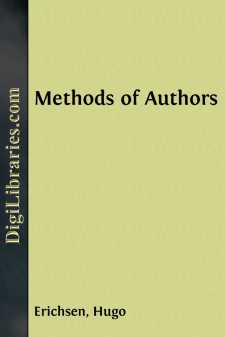Categories
- Antiques & Collectibles 13
- Architecture 36
- Art 48
- Bibles 22
- Biography & Autobiography 813
- Body, Mind & Spirit 142
- Business & Economics 28
- Children's Books 17
- Children's Fiction 14
- Computers 4
- Cooking 94
- Crafts & Hobbies 4
- Drama 346
- Education 46
- Family & Relationships 57
- Fiction 11829
- Games 19
- Gardening 17
- Health & Fitness 34
- History 1377
- House & Home 1
- Humor 147
- Juvenile Fiction 1873
- Juvenile Nonfiction 202
- Language Arts & Disciplines 88
- Law 16
- Literary Collections 686
- Literary Criticism 179
- Mathematics 13
- Medical 41
- Music 40
- Nature 179
- Non-Classifiable 1768
- Performing Arts 7
- Periodicals 1453
- Philosophy 64
- Photography 2
- Poetry 896
- Political Science 203
- Psychology 42
- Reference 154
- Religion 513
- Science 126
- Self-Help 84
- Social Science 81
- Sports & Recreation 34
- Study Aids 3
- Technology & Engineering 59
- Transportation 23
- Travel 463
- True Crime 29
Methods of Authors
by: Hugo Erichsen
Description:
Excerpt
The public—that is, the reading world made up of those who love the products of authorship—always takes an interest in the methods of work adopted by literary men, and is fond of gaining information about authorship in the act, and of getting a glimpse of its favorite, the author, at work in that "sanctum sanctorum"—the study. The modes in which men write are so various that it would take at least a dozen volumes to relate them, were they all known, for:—
"Some wits are only in the mindWhen beaux and belles are 'round them prating;
Some, when they dress for dinner, find
Their muse and valet both in waiting;
And manage, at the self-same time,
To adjust a neckcloth and a rhyme.
"Some bards there are who cannot scribble
Without a glove to tear or nibble;
Or a small twig to whisk about—
As if the hidden founts of fancy,
Like wells of old, were thus found out
By mystic tricks of rhabdomancy.
was the little feathery wand,
That, held forever in the hand
Of her who won and wore the crown
Of female genius in this age,
Seemed the conductor that drew down
Those words of lightning to her page."
This refers to Madame de Staël, who, when writing, wielded a "little feathery wand," made of paper, shaped like a fan or feather, in the manner and to the effect above described.
Well may the vivacious penman of "Rhymes on the Road" exclaim:—
"What various attitudes, and ways,And tricks we authors have in writing!
While some write sitting, some, like Bayes,
Usually stand while they're inditing.
Poets there are who wear the floor out,
Measuring a line at every stride;
While some, like Henry Stephens, pour out
Rhymes by the dozen while they ride.
Herodotus wrote most in bed;
And Richerand, a French physician,
Declares the clockwork of the head
Goes best in that reclined position.
If you consult Montaigne and Pliny on
The subject, 'tis their joint opinion
That thought its richest harvest yields
Abroad, among the woods and fields."
M. de Valois alleges that Plato produced, like Herodotus, "his glorious visions all in bed"; while
"'Twas in his carriage the sublimeSir Richard Blackmore used to rhyme."
But little is known of the habits of the earliest writers. The great Plato, whose thoughts seemed to come so easy, we are told, toiled over his manuscripts, working with slow and tiresome elaboration. The opening sentence of "The Republic" on the author's tablets was found to be written in thirteen different versions. When death called him from his labor the great philosopher was busy at his desk, "combing, and curling, and weaving, and unweaving his writings after a variety of fashions." Virgil was wont to pour forth a quantity of verses in the morning, which he decreased to a very small number by incessant correction and elimination. He subjected the products of his composition to a process of continual polishing and filing, much after the manner, as he said himself, of a bear licking her cubs into shape. Cicero's chief pleasure was literary work....


